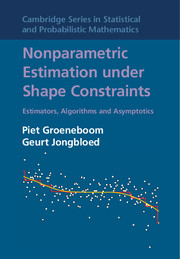Book contents
- Frontmatter
- Contents
- Preface and Acknowledgments
- 1 Introduction
- 2 Basic Estimation Problems with Monotonicity Constraints
- 3 Asymptotic Theory for the Basic Monotone Problems
- 4 Other Univariate Problems Involving Monotonicity Constraints
- 5 Higher Dimensional Problems
- 6 Lower Bounds on Estimation Rates
- 7 Algorithms and Computation
- 8 Shape and Smoothness
- 9 Testing and Confidence Intervals
- 10 Asymptotic Theory of Smooth Functionals
- 11 Pointwise Asymptotic Distribution Theory for Univariate Problems
- 12 Pointwise Asymptotic Distribution Theory for Multivariate Problems
- 13 Asymptotic Distribution of Global Deviations
- References
- Author Index
- Subject Index
10 - Asymptotic Theory of Smooth Functionals
Published online by Cambridge University Press: 18 December 2014
- Frontmatter
- Contents
- Preface and Acknowledgments
- 1 Introduction
- 2 Basic Estimation Problems with Monotonicity Constraints
- 3 Asymptotic Theory for the Basic Monotone Problems
- 4 Other Univariate Problems Involving Monotonicity Constraints
- 5 Higher Dimensional Problems
- 6 Lower Bounds on Estimation Rates
- 7 Algorithms and Computation
- 8 Shape and Smoothness
- 9 Testing and Confidence Intervals
- 10 Asymptotic Theory of Smooth Functionals
- 11 Pointwise Asymptotic Distribution Theory for Univariate Problems
- 12 Pointwise Asymptotic Distribution Theory for Multivariate Problems
- 13 Asymptotic Distribution of Global Deviations
- References
- Author Index
- Subject Index
Summary
In Chapter 3, asymptotic results were derived for the basic problems with monotonicity restrictions. The consistency results were global (sometimes uniform) whereas only pointwise asymptotic distributions were derived. These results were related to convex minorants and explicit representations of estimators. In this chapter, asymptotic results will be derived for quantities that depend more globally on the underlying distribution. These results can be obtained using so-called smooth functional theory.
In Section 10.1, we discuss the asymptotic distribution of the maximum likelihood estimator of the expected value of the underlying random variable in the deconvolution model. Computing this estimator requires some computational effort. We compare the asymptotics of this estimator to that of a natural and easy-to-compute competitor, the sample mean minus the expectation of the noise variable. The approach is based on smooth functional theory, where functionals of the underlying distribution of interest are approximated by smooth functionals of the observation distribution.
The remaining sections are devoted to smooth functionals for the interval censoring model. The theory is still moderately straightforward for the interval censoring case 1 model (or current status model) to be considered in Section 10.2, where we have an explicit expression for the score functions. This is rather different for the interval censoring case 2 model, where one can only say that these score functions are solutions of certain integral equations and the whole theory has to be developed from properties of these solutions. Important properties will be studied in Section 10.3. In Section 10.4 the properties are used to derive the asymptotic distribution of the MLE for smooth functionals in the interval censoring case 2 model. We only treat the so-called separated case, where the intervals between the two observation times cannot become arbitrarily small. This separated case is treated in full detail, since it seems to give the prototype for what to do in the case that the score functions are not explicitly given.
- Type
- Chapter
- Information
- Nonparametric Estimation under Shape ConstraintsEstimators, Algorithms and Asymptotics, pp. 283 - 312Publisher: Cambridge University PressPrint publication year: 2014



